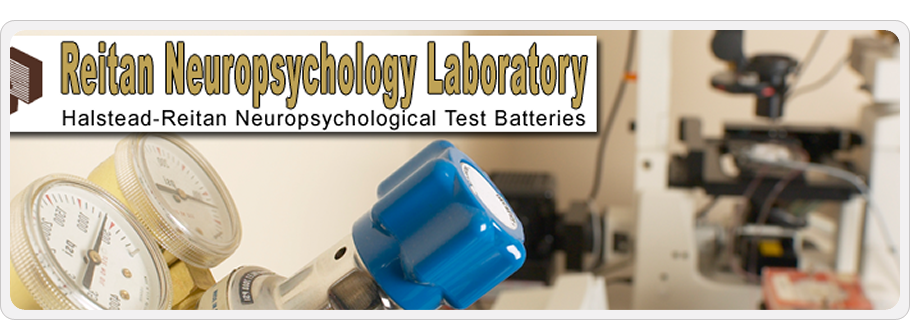| |
Selling Neuropsychological Testing Equipment
Used for Diagnosing Brain Damage
Click here to visit our online store
|
|
|
|
|
|
Reitan Neuropsychology Laboratory sells the Trail Making Test along with many other neuropsychological testing kits and products. Call us to learn more about the other tests we have available.
Trail Making Test for Adults (Item #18)
For evaluation of persons 15 years of age and older, the Trail Making Test (Part A and Part B) is one of the most widely used and most sensitive brief examinations for brain impairment. Recent research shows that Trails B is an excellent broad screening procedure for possible neuropsychological impairment.
The Trail Making Test requires the subject to keep the alphabetical and numerical sequences in mind, shifting back and forth while integrating them and simultaneously searching the page for the correct stimulus item, all under the pressure of doing the task as rapidly as possible (and thus measuring efficiency of performance per unit of time). The test emphasizes flexibility in organizing stimulus material, keeping two sequences in mind at the same time, and accomplishing the task quickly.
The individual's score on the Trail Making Test contributes to the Neuropsychological Deficit Scale (NDS) score.
This item contains 100 copies of Part A, 100 copies of Part B, and the Manual for Administration.
|
|
|
|
Trail Making Test For Older Children (Item #19)
For evaluation of older children (9 to 14 years), this Trail Making Test is similar to the Trail Making Test for adults, except that the child deals with 15 stimuli rather than 25. This test requires immediate recognition of the symbolic significance of numbers and letters, ability to scan the page continuously to identify the next number or letter in sequence, flexibility in integrating the numerical and alphabetical series, and completion of these requirements under the pressure of time. The Trail Making Test is one of the best measures of general brain function (Reitan 1955, 1958, 2009, in press).
The child's scores on the Trail Making Test contribute to the Neuronpsychological Deficit Scale (NDS) for Older Children.
|
Instructions for administration and scoring of the Trail Making Test for Children can be found in the following publication: Neuropsychological Evaluation of older Children (item #65).
This item contains 100 copies of Part A, 100 copies of Part B, and the Manual for Administration. BUY NOW
|
|
Aphasia Screening Test Booklet ( Item # 75)
For evaluation of adults (15 years and older), older children (9 to 14 years), and young children (5 to 8 years), the Aphasia Test requires the subject to perform a series of tasks: name common objects; spell simple words; identify individual numbers and letters; read, write, enunciate, and understand spoken language; identify body parts; calculate simple arithmetic problems; differentiate between right and left; and copy simple geometric shapes.
|
|
|
The Aphasia Test is organized so that these various performances are examined, to some extent, in terms of the particular sensory modalities through which the stimuli are perceived.
The receptive and expressive components of the Aphasia Test (as differentially required by various items) provide an opportunity to judge whether the limiting deficit for an individual is principally receptive or expressive in character. These simple performance, when defective, provide powerful evidence that implicates the left cerebral hemisphere (language skills) or the right hemisphere (visual-spatial tasks) (Reitan, 1984; Wheeler & Reitan, 1962). When distinct deficits are present, the findings are of special significance because such deficits rarely occur in persons without brain damage.
Instructions for administration and scoring of the Aphasia Test, as well as comprehensive guides to identifying brain-related deficits on the Aphasia Test, including examples of responses and scoring on the Neuropsychological Deficit Scale, can be found in the following publications: The Halstead-Reitan Neurpsychological Test Battery: Theory and Clinical Interpretation, Neurpsychological Evaluation of Older Children, and Neuropsychological Evaluation of Young Children.
The individual's performances on the Aphasia Test contribute to the Neuropsychological Deficit Scales for adults, older children and young children.
|
|
| Contact us to order the testing supplies and equipment you need for your practice. |
|
|
|


